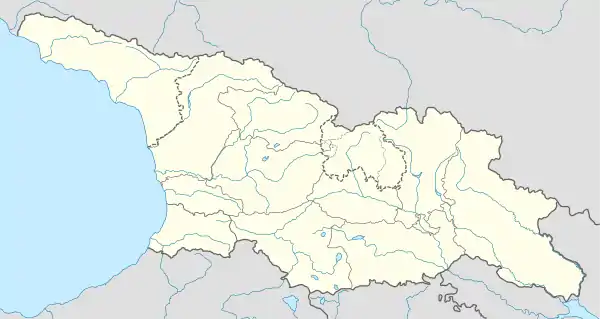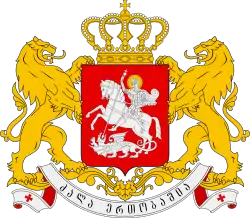Bolnisi
Bolnisi (Georgian: ბოლნისი), is a city in the country of Georgia, located in the Kvemo Kartli region and capital of the Bolnisi district. It currently has an estimated 13,800 inhabitants.
Bolnisi
ბოლნისი Çörük-Qəmərli | |
|---|---|
 | |
 Flag  Seal | |
 Bolnisi  Bolnisi | |
| Coordinates: 41°27′N 44°32′E | |
| Country | |
| Mkhare | Kvemo Kartli |
| Municipality | Bolnisi |
| Elevation | 420 m (1,380 ft) |
| Population (2014[1]) | |
| • Total | 8,967 |
.jpg.webp)


In 1818 the colony Katharinenfeld was founded in Bolnisi by 95 German colonist families from Swabia. After the occupation of the Red Army in 1921, it was renamed to Luxemburg after the German communist Rosa Luxemburg. In 1941 all the Germans descendants who were not married to Georgians were deported to Siberia and Kazakhstan. There are still remnants of the German past in Bolnisi. A small graveyard and plaque acknowledges the German influence in the village. A small street called Mill Street has evidence of 19th-century German architecture and a few signs in the German language that date from the early 20th century. In 1944, the town was once again renamed as Bolnisi.
The economy is mostly agrarian with the notable exceptions of a winery, brewery, and a gold mine in the nearby village of Kazreti.
Bolnisi has long been the seat of a bishop or archbishop, and is the home of the oldest dated Christian structure in Georgia.[2] It is known as Bolnisi Sioni (Sioni being Georgian for Zion and a designation used by many of their churches). This three-nave basilica church dates to the 5th century AD and features some pagan elements in its stonework. The original roof is missing but has been replaced with a modern covering.
A dedication Bolnisi inscriptions from the Bolnisi church, carved in the late 5th century, is one of the oldest dated specimens of Georgian writing. It mentions Bishop David of Bolnisi and two Sassanid kings Peroz I and Kavadh I.[2]
An airfield near the city was reported to have been bombed by Russia on August 8, 2008 during the Russia-Georgia war. ]
References
- "Population Census 2014". www.geostat.ge. National Statistics Office of Georgia. November 2014. Retrieved 2 June 2016.
- Rapp, Stephen H. (2003), Studies In Medieval Georgian Historiography: Early Texts And Eurasian Contexts, p. 316. Peeters Bvba, ISBN 90-429-1318-5.

